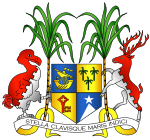1886 Mauritian general election
 |
|---|
| Constitution |
General elections were held for the first time in Mauritius between 11 and 20 January 1886.[1] They followed the introduction of a new constitution the previous year. The and (also known as the Oligarchs) each won five of the ten elected seats.[1]
Electoral system[]
The new constitution provided for a 28-member , which consisted of the Governor, 12 officials, 5 appointed members and 10 elected members.[2] The ten elected members were returned from nine constituencies formed from the nine districts, which all districts returning one member except Port Louis, which returned two.[3] Voting took place in each constituency on a different day, starting in Port Louis on 11 January and ending in Grand Port on 20 January.[1]
The franchise for the elections was severely limited; the right to vote was restricted to male British subjects aged 21 and over and who possessed Rs300 of immovable property or movable property worth Rs3,000, a monthly salary of Rs50, those paying rent of Rs25 a month or paying a licence duty of at Rs200 a year. People married to eligible voters, or the oldest son of a qualifying widow were also entitled to vote.[3] As a result, although the population of Mauritius was 359,688, only 4,061 people were eligible to vote,[1] of which just 253 were Asian.[4]
Campaign[]
A total of 25 candidates contested the elections; led by William Newton,[1] the Reformists nominated ran candidates in all ten constituencies. The Democrats put forward nine, with their leader running in two constituencies. The remaining six candidates were independents, one of whom (Arthur Pitot) also ran in two candidates.[1]
Despite the limited franchise, election notices were published in English, French, Hindustani (written in Arabic script), Tamil and Chinese.[5]
Results[]
| Party | Votes | % | Seats | |
|---|---|---|---|---|
| 2,709 | 49.21 | 5 | ||
| 2,136 | 38.80 | 5 | ||
| Independents | 660 | 11.99 | 0 | |
| Total | 5,505 | 100.00 | 10 | |
| Registered voters/turnout | 4,061 | – | ||
| Source: Le Mauricien | ||||
By constituency[]
| Constituency | Candidate | Party | Votes | % |
|---|---|---|---|---|
| Flacq (222 registered) |
125 | 59.5 | ||
| Yves Pierre Jollivet | 85 | 40.5 | ||
| Grand Port (273 registered) |
109 | 50.5 | ||
| Edgar Gallet | 62 | 28.7 | ||
| Fabien Rault | Independent | 45 | 20.8 | |
| Moka (187 registered) |
137 | 81.5 | ||
| Onésipho Beaugeard | 31 | 18.5 | ||
| Pamplemousses (270 registered) |
156 | 51.8 | ||
| W A Edwards | 96 | 31.9 | ||
| De Evenor Chazal | Independent | 45 | 15.0 | |
| Louis Vigoureux | Independent | 4 | 1.3 | |
| Plaines Wilhems (653 registered) |
407 | 67.3 | ||
| Povah Ambrose | 194 | 32.1 | ||
| Arthur Pitot | Independent | 4 | 0.7 | |
| Port Louis (1,986 registered) |
941 | 26.4 | ||
| Gustave de Coriolis | 879 | 24.7 | ||
| William Newton | 705 | 19.8 | ||
| John Alexander Ferguson | Independent | 523 | 14.7 | |
| Georges Guibert | 511 | 14.4 | ||
| Rivière du Rempart (163 registered) |
61 | 39.6 | ||
| Louis Rouillard | 55 | 35.7 | ||
| P L Chastellier | Independent | 38 | 24.7 | |
| Rivière Noire (115 registered) |
55 | 51.4 | ||
| Thorny Pitot | 51 | 47.7 | ||
| Arthur Pitot | Independent | 1 | 0.9 | |
| Savanne (192 registered) |
Virgile Naz | 149 | 80.5 | |
| Anderson James Forrester | 36 | 19.5 |
References[]
- ^ a b c d e f HISTOIRE: Les premières élections générales opposent Oligarques et Démocrates Le Mauricien, 26 December 2011
- ^ Sydney Selvon (2012) A New Comprehensive History of Mauritius: From British Mauritius to the 21st century
- ^ a b Constitutional Evolution of Mauritius from British rule to Independence Archived 2015-12-08 at the Wayback Machine Government of Mauritius
- ^ Dolf Sternberger, Bernhard Vogel, Dieter Nohlen & Klaus Landfried (1978) Die Wahl der Parlamente: Band II: Afrika, Zweiter Halbband, p1394
- ^ Kenneth Ballhatchet (1995) "The structure of British official attitudes: Colonial Mauritius 1883−1968" The Historical Journal, Vol. 38 No. 4, pp989−1011
- 1886 elections in Africa
- Elections in Mauritius
- 1886 in Mauritius
- January 1886 events